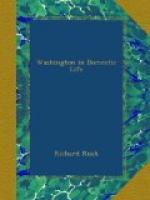Philadelphia, May 6, 1794. This is a letter written to Mr. Lear when the latter was in England. It treats of private matters, and expresses his pleasure at the reception he had from the Earl of Buchan, Sir John Sinclair, and others in England to whom General Washington had given him letters. He tells him he was much obliged to him for the several communications in his letters, and placed great reliance on them; that the opportunities he derived from mixing with people in different walks, high and low, and of different political sentiments, must have afforded him an extensive range for observation and comparison; more so by far than could fall to the lot of a stationary person always revolving in a particular circle. The General then touches on our home affairs. [He was still President, it will be remembered.] He says that to tell him the British order in council of the 8th of June last respecting neutral vessels had given much discontent in the United States; and that that of the 6th of November had thrown the people into a flame, could hardly be new to him. In reference to all the existing difficulties with England he tells him that many measures had been moved in Congress, some of which had passed into acts, and others were pending; that among the former was a law for fortifying our principal seaports, and another for raising an additional corps of eight hundred artillery-men for the defence of them and other purposes; and that the bills pending were: 1st. One to complete our present military establishment; 2d. One to raise an army of twenty-five thousand men in addition to it; and 3d. A bill to organize, put in training, and hold in readiness at a minute’s warning a select corps of eighty thousand militia. He seemed to think that the first and last would pass, but that the result of the second could not be so well predicted. He mentions the appointment of Mr. Jay as special minister to England in the hope of settling all our difficulties in a temperate way by fair and firm negotiation, and that he would sail in a few days, with Mr. John Trumbell as his private Secretary; tells him also of Mr. Randolph’s appointment as Secretary of State, and that Mr. Bradford, of Pennsylvania, was made Attorney General in Mr. Randolph’s place. In conclusion, he alludes to “little Lincoln” [Mr. Lear’s son] and his “lottery tickets,” which, “poor little fellow!” he exclaims, will never be likely to build him a baby-house even; the whole Washington lottery business having turned out a bed of thorns rather than roses. He terminates the letter by telling him that his public avocations will not admit of more than a flying trip to Mount Vernon this summer, and that this not suiting Mrs. Washington he has taken a house in Germantown [the vicinity of Philadelphia] to avoid the heat of Philadelphia in July and August, and that Mrs. Washington, Nelly [one of the Miss Custi’s], and the rest of the family united with him in every good wish for his health, prosperity, and safe return; and he begs him to be “assured of the sincerity with which he was and always should be his affectionate friend, G.W.”




